- Home
- Dennis Lehane
Shutter Island Page 2
Shutter Island Read online
Page 2
“You okay?” Chuck asked. “You look pale.”
Teddy shrugged it off. “I’m fine.”
“Sure?”
Teddy nodded. “Just finding my sea legs.”
They stood in silence for a bit, the sea undulating all around them, pockets of it as dark and silken as velvet.
“You know it used to be a POW camp?” Teddy said.
Chuck said, “The island?”
Teddy nodded. “Back in the Civil War. They built a fort there, barracks.”
“What do they use the fort for now?”
Teddy shrugged. “Couldn’t tell you. There’s quite a few of them out here on the different islands. Most of them were target practice for artillery shells during the war. Not too many left standing.”
“But the institution?”
“From what I could tell, they use the old troop quarters.”
Chuck said, “Be like going back to basic, huh?”
“Don’t wish that on us.” Teddy turned on the rail. “So what’s your story there, Chuck?”
Chuck smiled. He was a bit stockier and a bit shorter than Teddy, maybe five ten or so, and he had a head of tight, curly black hair and olive skin and slim, delicate hands that seemed incongruous with the rest of him, as if he’d borrowed them until his real ones came back from the shop. His left cheek bore a small scythe of a scar, and he tapped it with his index finger.
“I always start with the scar,” he said. “People usually ask sooner or later.”
“Okay.”
“Wasn’t from the war,” Chuck said. “My girlfriend says I should just say it was, be done with it, but…” He shrugged. “It was from playing war, though. When I was a kid. Me and this other kid shooting slingshots at each other in the woods. My friend’s rock just misses me, so I’m okay, right?” He shook his head. “His rock hit a tree, sent a piece of bark into my cheek. Hence the scar.”
“From playing war.”
“From playing it, yeah.”
“You transferred from Oregon?”
“Seattle. Came in last week.”
Teddy waited, but Chuck didn’t offer any further explanation.
Teddy said, “How long you been with the marshals?”
“Four years.”
“So you know how small it is.”
“Sure. You want to know how come I transferred.” Chuck nodded, as if deciding something for himself. “If I said I was tired of rain?”
Teddy turned his palms up above the rail. “If you said so…”
“But it’s small, like you said. Everyone knows everyone in the service. So eventually, there’ll be—what do they call it?—scuttlebutt.”
“That’s word for it.”
“You caught Breck, right?”
Teddy nodded.
“How’d you know where he’d go? Fifty guys chasing him, they all went to Cleveland. You went to Maine.”
“He’d summered there once with his family when he was a kid. That thing he did with his victims? It’s what you do to horses. I talked to an aunt. She told me the only time he was ever happy was at a horse farm near this rental cottage in Maine. So I went up there.”
“Shot him five times,” Chuck said and looked down the bow at the foam.
“Would have shot him five more,” Teddy said. “Five’s what it took.”
Chuck nodded and spit over the rail. “My girlfriend’s Japanese. Well, born here, but you know…Grew up in a camp. There’s still a lot of tension out there—Portland, Seattle, Tacoma. No one likes me being with her.”
“So they transferred you.”
Chuck nodded, spit again, watched it fall into the churning foam.
“They say it’s going to be big,” he said.
Teddy lifted his elbows off the rail and straightened. His face was damp, his lips salty. Somewhat surprising that the sea had managed to find him when he couldn’t recall the spray hitting his face.
He patted the pockets of his overcoat, looking for his Chesterfields. “Who’s ’they’? What’s ’it’?”
“They. The papers,” Chuck said. “The storm. Big one, they say. Huge.” He waved his arm at the pale sky, as pale as the foam churning against the bow. But there, along its southern edge, a thin line of purple cotton swabs grew like ink blots.
Teddy sniffed the air. “You remember the war, don’t you, Chuck?”
Chuck smiled in such a way that Teddy suspected they were already tuning in to each other’s rhythms, learning how to fuck with each other.
“A bit,” Chuck said. “I seem to remember rubble. Lots of rubble. People denigrate rubble, but I say it has its place. I say it has its own aesthetic beauty. I say it’s all in the eye of the beholder.”
“You talk like a dime novel. Has anyone else told you that?”
“It’s come up.” Chuck giving the sea another of his small smiles, leaning over the bow, stretching his back.
Teddy patted his trouser pockets, searched the inside pockets of his suit jacket. “You remember how often the deployments were dependent on weather reports.”
Chuck rubbed the stubble on his chin with the heel of his hand. “Oh, I do, yes.”
“Do you remember how often those weather reports proved correct?”
Chuck furrowed his brow, wanting Teddy to know he was giving this due and proper consideration. Then he smacked his lips and said, “About thirty percent of the time, I’d venture.”
“At best.”
Chuck nodded. “At best.”
“And so now, back in the world as we are…”
“Oh, back we are,” Chuck said. “Ensconced, one could even say.”
Teddy suppressed a laugh, liking this guy a lot now. Ensconced. Jesus.
“Ensconced,” Teddy agreed. “Why would you put any more credence in the weather reports now than you did then?”
“Well,” Chuck said as the sagging tip of a small triangle peeked above the horizon line, “I’m not sure my credence can be measured in terms of less or more. Do you want a cigarette?”
Teddy stopped in the middle of a second round of pocket pats, found Chuck watching him, his wry grin etched into his cheeks just below the scar.
“I had them when I boarded,” Teddy said.
Chuck looked back over his shoulder. “Government employees. Rob you blind.” Chuck shook a cigarette free of his pack of Luckies, handed one to Teddy, and lit it for him with his brass Zippo, the stench of the kerosene climbing over the salt air and finding the back of Teddy’s throat. Chuck snapped the lighter closed, then flicked it back open with a snap of his wrist and lit his own.
Teddy exhaled, and the triangle tip of the island disappeared for a moment in the plume of smoke.
“Overseas,” Chuck said, “When a weather report dictated if you went to the drop zone with your parachute pack or set off for the beachhead, well, there was much more at stake, wasn’t there?”
“True.”
“But back home, where’s the harm in a little arbitrary faith? That’s all I’m saying, boss.”
It began to reveal itself to them as more than a triangle tip, the lower sections gradually filling in until the sea stretched out flat again on the other side of it and they could see colors filling in as if by brush stroke—a muted green where the vegetation grew unchecked, a tan strip of shoreline, the dull ochre of cliff face on the northern edge. And at the top, as they churned closer, they began to make out the flat rectangular edges of buildings themselves.
“It’s a pity,” Chuck said.
“What’s that?”
“The price of progress.” He placed one foot on the towline and leaned against the rail beside Teddy, and they watched the island attempt to define itself. “With the leaps—and there are leaps going on, don’t kid yourself, leaps every day—happening in the field of mental health, a place like this will cease to exist. Barbaric they’ll call it twenty years from now. An unfortunate by-product of the bygone Victorian influence. And go it should, they’ll say. Incorporation, they’ll
say. Incorporation will be the order of the day. You are all welcomed into the fold. We will soothe you. Rebuild you. We are all General Marshalls. We are a new society, and there is no place for exclusion. No Elbas.”
The buildings had disappeared again behind the trees, but Teddy could make out the fuzzy shape of a conical tower and then hard, jutting angles he took to be the old fort.
“But do we lose our past to assure our future?” Chuck flicked his cigarette out into the foam. “That’s the question. What do you lose when you sweep a floor, Teddy? Dust. Crumbs that would otherwise draw ants. But what of the earring she misplaced? Is that in the trash now too?”
Teddy said, “Who’s ’she’? Where did ’she’ come from, Chuck?”
“There’s always a she. Isn’t there?”
Teddy heard the whine of the engine change pitch behind them, felt the ferry give a small lurch underfoot, and he could see the fort clearer now atop the southern cliff face as they came around toward the western side of the island. The cannons were gone, but Teddy could make out the turrets easily enough. The land went back into hills behind the fort, and Teddy figured the walls were back there, blurring into the landscape from his current angle, and then Ashecliffe Hospital sat somewhere beyond the bluffs, overlooking the western shore.
“You got a girl, Teddy? Married?” Chuck said.
“Was,” Teddy said, picturing Dolores, a look she gave him once on their honeymoon, turning her head, her chin almost touching her bare shoulder, muscles moving under the flesh near her spine. “She died.”
Chuck came off the rail, his neck turning pink. “Oh, Jesus.”
“It’s okay,” Teddy said.
“No, no.” Chuck held his palm up by Teddy’s chest. “It’s…I’d heard that. I don’t know how I could’ve forgotten. A couple of years ago, wasn’t it?”
Teddy nodded.
“Christ, Teddy. I feel like an idiot. Really. I’m so sorry.”
Teddy saw her again, her back to him as she walked down the apartment hallway, wearing one of his old uniform shirts, humming as she turned into the kitchen, and a familiar weariness invaded his bones. He would prefer to do just about anything—swim in that water even—rather than speak of Dolores, of the facts of her being on this earth for thirty-one years and then ceasing to be. Just like that. There when he left for work that morning. Gone by the afternoon.
But it was like Chuck’s scar, he supposed—the story that had to be dispensed with before they could move on, or otherwise it would always be between them. The hows. The wheres. The whys.
Dolores had been dead for two years, but she came to life at night in his dreams, and he sometimes went full minutes into a new morning thinking she was out in the kitchen or taking her coffee on the front stoop of their apartment on Buttonwood. This was a cruel trick of the mind, yes, but Teddy had long ago accepted the logic of it—waking, after all, was an almost natal state. You surfaced without a history, then spent the blinks and yawns reassembling your past, shuffling the shards into chronological order before fortifying yourself for the present.
What was far crueler were the ways in which a seemingly illogical list of objects could trigger memories of his wife that lodged in his brain like a lit match. He could never predict what one of the objects would be—a shaker of salt, the gait of a strange woman on a crowded street, a bottle of Coca-Cola, a smudge of lipstick on a glass, a throw pillow.
But of all the triggers, nothing was less logical in terms of connective tissue, or more pungent in terms of effect, than water—drizzling from the tap, clattering from the sky, puddled against the sidewalk, or, as now, spread around him for miles in every direction.
He said to Chuck: “There was a fire in our apartment building. I was working. Four people died. She was one of them. The smoke got her, Chuck, not the fire. So she didn’t die in pain. Fear? Maybe. But not pain. That’s important.”
Chuck took another sip from his flask, offered it to Teddy again.
Teddy shook his head. “I quit. After the fire. She used to worry about it, you know? Said all of us soldiers and cops drank too much. So…” He could feel Chuck beside him, sinking in embarrassment, and he said, “You learn how to carry something like that, Chuck. You got no choice. Like all the shit you saw in the war. Remember?”
Chuck nodded, his eyes going small with memory for a moment, distant.
“It’s what you do,” Teddy said softly.
“Sure,” Chuck said eventually, his face still flushed.
The dock appeared as if by trick of light, stretching out from the sand, a stick of chewing gum from this distance, insubstantial and gray.
Teddy felt dehydrated from his time at the toilet and maybe a bit exhausted from the last couple of minutes; no matter how much he’d learned to carry it, carry her, the weight could wear him down every now and then. A dull ache settled into the left side of his head, just behind his eye, as if the flat side of an old spoon were pressed there. It was too early to tell if it were merely a minor side effect of the dehydration, the beginnings of a common headache, or the first hint of something worse—the migraines that had plagued him since adolescence and that at various times could come so strongly they could temporarily rob him of vision in one eye, turn light into a hailstorm of hot nails, and had once—only once, thank God—left him partially paralyzed for a day and a half. Migraines, his anyway, never visited during times of pressure or work, only afterward, when all had quieted down, after the shells stopped dropping, after the pursuit was ended. Then, at base camp or barracks or, since the war, in motel rooms or driving home along country highways—they came to do their worst. The trick, Teddy had long since learned, was to stay busy and stay focused. They couldn’t catch you if you didn’t stop running.
He said to Chuck, “Heard much about this place?”
“A mental hospital, that’s about all I know.”
“For the criminally insane,” Teddy said.
“Well, we wouldn’t be here if it weren’t,” Chuck said.
Teddy caught him smiling that dry grin again. “You never know, Chuck. You don’t look a hundred percent stable to me.”
“Maybe I’ll put a deposit down on a bed while we’re here, for the future, make sure they hold a place for me.”
“Not a bad idea,” Teddy said as the engines cut out for a moment, and the bow swung starboard as they turned with the current and the engines kicked in again and Teddy and Chuck were soon facing the open sea as the ferry backed toward the dock.
“Far as I know,” Teddy said, “they specialize in radical approaches.”
“Red?” Chuck said.
“Not Red,” Teddy said. “Just radical. There’s a difference.”
“You wouldn’t know it lately.”
“Sometimes, you wouldn’t,” Teddy agreed.
“And this woman who escaped?”
Teddy said, “Don’t know much about that. She slipped out last night. I got her name in my notebook. I figure they’ll tell us everything else.”
Chuck looked around at the water. “Where’s she going to go? She’s going to swim home?”
Teddy shrugged. “The patients here, apparently, suffer a variety of delusions.”
“Schizophrenics?”
“I guess, yeah. You won’t find your everyday mongoloids in here in any case. Or some guy who’s afraid of sidewalk cracks, sleeps too much. Far as I could tell from the file, everyone here is, you know, really crazy.”
Chuck said, “How many you think are faking it, though? I’ve always wondered that. You remember all the Section Eights you met in the war? How many, really, did you think were nuts?”
“I served with a guy in the Ardennes—”
“You were there?”
Teddy nodded. “This guy, he woke up one day speaking backward.”
“The words or the sentences?”
“Sentences,” Teddy said. “He’d say, ’Sarge, today here blood much too is there.’ By late afternoon, we found him in a foxhole, hitti
ng his own head with a rock. Just hitting it. Over and over. We were so rattled that it took us a minute to realize he’d scratched out his own eyes.”
“You are shitting me.”
Teddy shook his head. “I heard from a guy a few years later who ran across the blind guy in a vet hospital in San Diego. Still talking backward, and he had some sort of paralysis that none of the doctors could diagnose the cause of, sat in a wheelchair by the window all day, kept talking about his crops, he had to get to his crops. Thing was, the guy grew up in Brooklyn.”
“Well, guy from Brooklyn thinks he’s a farmer, I guess he is Section Eight.”
“That’s one tip-off, sure.”
2
DEPUTY WARDEN MCPHERSON met them at the dock. He was young for a man of his rank, and his blond hair was cut a bit longer than the norm, and he had the kind of lanky grace in his movements that Teddy associated with Texans or men who’d grown up around horses.
He was flanked by orderlies, mostly Negroes, a few white guys with deadened faces, as if they hadn’t been fed enough as babies, had remained stunted and annoyed ever since.
The orderlies wore white shirts and white trousers and moved in a pack. They barely glanced at Teddy and Chuck. They barely glanced at anything, just moved down the dock to the ferry and waited for it to unload its cargo.
Teddy and Chuck produced their badges upon request and McPherson took his time studying them, looking up from the ID cards to their faces, squinting.
“I’m not sure I’ve ever seen a U.S. marshal’s badge before,” he said.
“And now you’ve seen two,” Chuck said. “A big day.”
He gave Chuck a lazy grin and flipped the badge back at him.
The beach looked to have been lashed by the sea in recent nights; it was strewn with shells and driftwood, mollusk skeletons and dead fish half eaten by whatever scavengers lived here. Teddy noticed trash that must have blown in from the inner harbor—cans and sodden wads of paper, a single license plate tossed up by the tree line and washed beige and numberless by the sun. The trees were mostly pine and maple, thin and haggard, and Teddy could see some buildings through the gaps, sitting at the top of the rise.

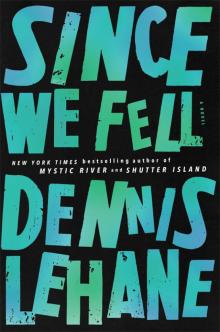 Since We Fell
Since We Fell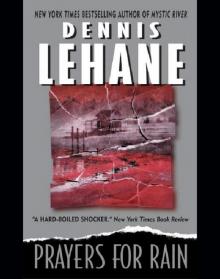 Prayers for Rain
Prayers for Rain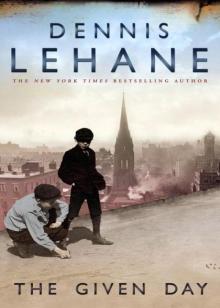 The Given Day
The Given Day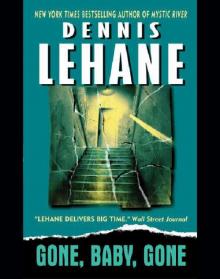 Gone, Baby, Gone
Gone, Baby, Gone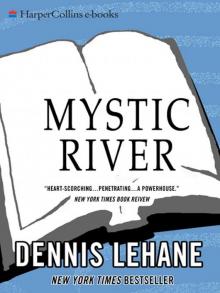 Mystic River
Mystic River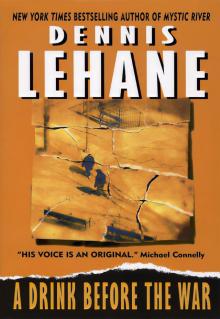 A Drink Before the War
A Drink Before the War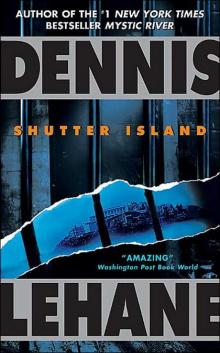 Shutter Island
Shutter Island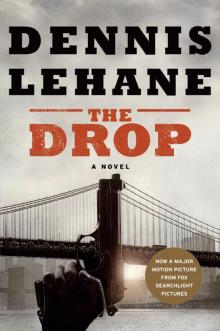 The Drop
The Drop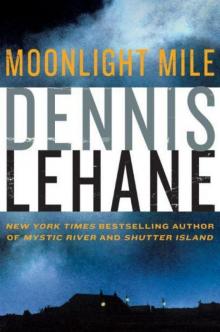 Moonlight Mile
Moonlight Mile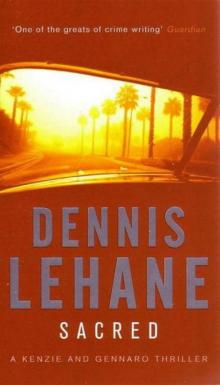 Sacred
Sacred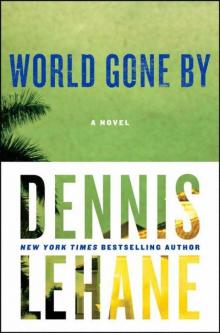 World Gone By
World Gone By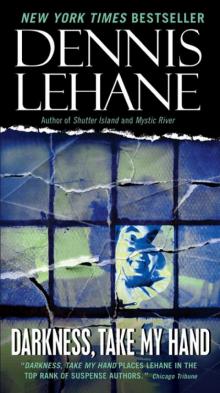 Darkness, Take My Hand
Darkness, Take My Hand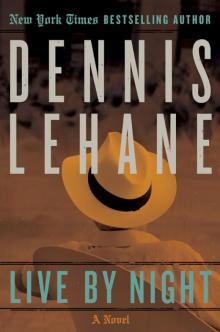 Live by Night
Live by Night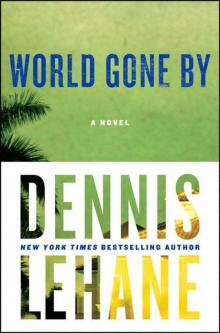 World Gone By: A Novel
World Gone By: A Novel Coronado
Coronado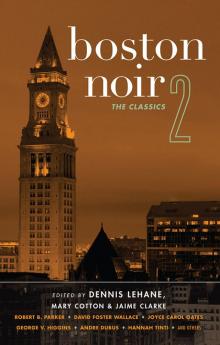 Boston Noir 2
Boston Noir 2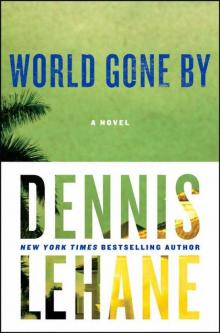 World Gone By: A Novel (Joe Coughlin Series)
World Gone By: A Novel (Joe Coughlin Series)